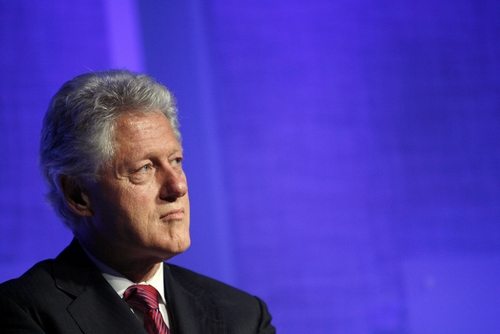
September 24, 2013; CNBC
You have to give Bill Clinton credit for a very fertile approach to corporate philanthropy. During one of the panels convened by the Clinton Global Initiative, the former president asked Mike Duke, the CEO of Walmart, “If the new president of Libya asked you to open a store in Tripoli, would you consider it?”
We’d bet that that question wasn’t scripted. Clinton tends to treat many of his public presentations like opportunities for jazz improvisation, but the members of his orchestra might not always be prepared for the complexity of Clinton’s chords. Walmart, for example, doesn’t have any stores in the Middle East or North Africa, so the Clinton question to Duke posed several improvisational challenges.
Sign up for our free newsletters
Subscribe to NPQ's newsletters to have our top stories delivered directly to your inbox.
By signing up, you agree to our privacy policy and terms of use, and to receive messages from NPQ and our partners.
Playing with the idea of Walmart in Libya, Clinton has riffed on the concept of “political risk insurance,” essentially the notion of government-underwritten insurance for companies that respond to requests to expand into politically unstable environments. CNBC’s John Carney described the idea as “sort of [a] Fannie Mae for global capitalism.”
Duke took the Clinton challenge from a different perspective, questioning where there might be underserved customers and the existence of competition. In the end, Duke never responded to the Libya question. There may, however, be an overriding reason why Duke squeezed his way out of the challenge beyond the lack of political risk insurance.
While Walmart has a big and generous philanthropic arm, which was until recently headed by President Obama’s director of the Office of Management and Budget, Sylvia Mathews Burwell, Walmart is first and foremost the world’s largest retailer and an immensely profitable business. The second-largest firm in the Global 500, the retailer follows big banks, Apple, and Samsung in overall profitability but still ranks in the top 20 most profitable companies in the world. It is not a charity.
Under Duke’s predecessor, Lee Scott, the corporation undertook a major effort to appear more socially responsible. Scott’s two big social initiatives revolved around environmental issues—shifting the corporation to renewable energy sources and zero waste—and Hurricane Katrina assistance. Scott also led Walmart to endorse the renewal of the Voting Rights Act, explaining, “It’s because we’re the largest employer of African Americans in the United States, and our associates care about it.” But it never gave up its focus on big profits. As the world’s largest employer, Walmart under Scott and Duke has been less receptive to something else its associates care about—the ability to join labor unions and raise their pitifully low wages. Just as Walmart played hardball—successfully—against a Washington, D.C. ordinance that would have required that its stores in the District pay a living wage, Walmart focuses on its bottom line. Despite pursuing a strategy in recent years of opening stores in metropolitan areas, which are more likely to be subject to union pressures than largely non-union rural areas, and opening up large supermarkets in their stores, an industry that is typically highly unionized, Walmart hasn’t budged on labor rights and workers’ hourly wages. The corporation has been dismissive of the union organizing efforts of the United Food and Commercial Workers.
The only place where Walmart seems to have given in on union organizing efforts is China, where the government-supported All-China Federation of Trade Unions got the Bentonville, Arkansas corporation to allow unions in all of its outlets in the country. Walmart has 390 outlets in China that serve a rapidly growing market of middle-income consumers that the bottom-line focused retailer was unlikely to ignore, especially with the Chinese leadership supporting the ACFTU. The compelling argument for Duke to respond to a call from the unnamed leader of Libya to open a Walmart outlet in Benghazi or Tripoli, with a questionable consumer base and shaky political support, isn’t quite so clear, even if there were a Fannie Mae equivalent to offer political risk underwriting.
There’s hardly any idea in the world that Bill Clinton’s supple intelligence can’t turn into an opportunity for philanthropy or social investment. But showing up at the Clinton Global Initiative and presenting the former president with a pledge or a check is probably more than a bit easier than contemplating a big box store in Libya.—Rick Cohen













